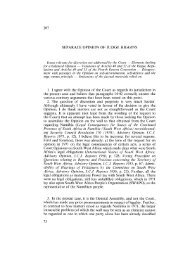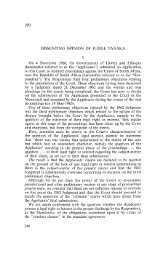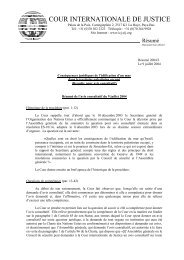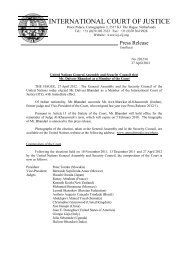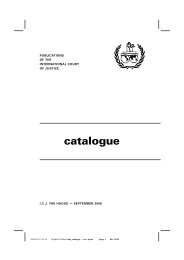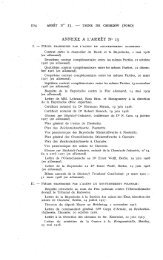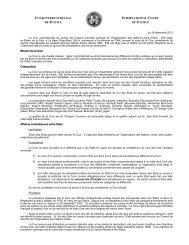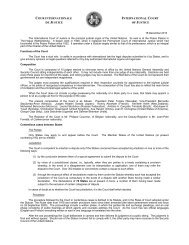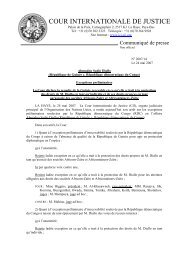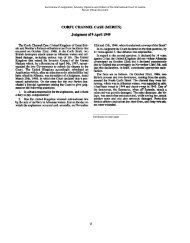Legality of the Threat or Use of Nuclear Weapons - Cour ...
Legality of the Threat or Use of Nuclear Weapons - Cour ...
Legality of the Threat or Use of Nuclear Weapons - Cour ...
You also want an ePaper? Increase the reach of your titles
YUMPU automatically turns print PDFs into web optimized ePapers that Google loves.
<strong>Cour</strong> internationale<br />
de Justice<br />
LA HAYE<br />
CR 95/33<br />
International <strong>Cour</strong>t<br />
<strong>of</strong> Justice<br />
THE HAGUE<br />
ANNEE 1995<br />
Audience publique<br />
tenue le mardi 14 novembre 1995, à 15 h 30, au Palais de la Paix,<br />
sous la présidence de M. Bedjaoui, Président<br />
sur la Licéité de l'utilisation des armes nucléaires<br />
par un Etat dans un conflit armé<br />
(Demande d'avis consultatif soumise par<br />
l'Organisation mondiale de la Santé)<br />
et<br />
sur la Licéité de la menace ou de l'emploi d'armes nucléaires<br />
(Demande d'avis consultatif soumise par<br />
l'Assemblée générale des Nations Unies)<br />
____________<br />
COMPTE RENDU<br />
____________<br />
YEAR 1995<br />
Public sitting<br />
held on Tuesday 14 November 1995, at 3.30 p.m., at <strong>the</strong> Peace Palace,<br />
President Bedjaoui presiding<br />
in <strong>the</strong> case<br />
in <strong>Legality</strong> <strong>of</strong> <strong>the</strong> <strong>Use</strong> by a State <strong>of</strong> <strong>Nuclear</strong> <strong>Weapons</strong> in Armed Conflict<br />
(Request f<strong>or</strong> Advis<strong>or</strong>y Opinion Submitted by <strong>the</strong> W<strong>or</strong>ld Health Organization)<br />
and<br />
in <strong>Legality</strong> <strong>of</strong> <strong>the</strong> <strong>Threat</strong> <strong>or</strong> <strong>Use</strong> <strong>of</strong> <strong>Nuclear</strong> <strong>Weapons</strong><br />
(Request f<strong>or</strong> Advis<strong>or</strong>y Opinion Submitted by<br />
<strong>the</strong> General Assembly <strong>of</strong> <strong>the</strong> United Nations)<br />
_______________<br />
VERBATIM RECORD<br />
_______________
- 2 -<br />
Présents : M. Bedjaoui, Président<br />
M. Schwebel, Vice-Président<br />
MM. Oda<br />
Guillaume<br />
Shahabuddeen<br />
Weeramantry<br />
Ranjeva<br />
Herczegh<br />
Shi<br />
Fleischhauer<br />
K<strong>or</strong>oma<br />
Vereshchetin<br />
Ferrari Bravo<br />
Mme Higgins, juges<br />
M. Valencia-Ospina, Greffier
- 3 -<br />
Present: President Bedjaoui<br />
Vice-President Schwebel<br />
Judges Oda<br />
Guillaume<br />
Shahabuddeen<br />
Weeramantry<br />
Ranjeva<br />
Herczegh<br />
Shi<br />
Fleischhauer<br />
K<strong>or</strong>oma<br />
Vereshchetin<br />
Ferrari Bravo<br />
Higgins<br />
Registrar<br />
Valencia-Ospina
- 4 -<br />
Licéité de l'utilisation des armes nucléaires par un Etat dans un conflit armé (Demande d'avis<br />
consultif soumise par l'Organisation mondiale<br />
de la Santé)<br />
L'Organisation mondiale de la Santé est représentée par :<br />
M. Claude-Henri Vignes, conseiller juridique;<br />
M. Thomas Topping, conseiller juridique adjoint.<br />
Licéité de l'utilisation des armes nucléaires par un Etat dans un conflit armé (Demande d'avis<br />
consultif soumise par l'Organisation mondiale<br />
de la Santé)<br />
et/ou<br />
Licéité de la menace ou de l'emploi d'armes nucléaires (Demande d'avis<br />
consultatif soumise par l'Assemblée générale des Nations Unies)<br />
Le Gouvernement de l'Australie est représenté par :<br />
M. Gavan Griffith, Q.C., Solicit<strong>or</strong>-General d'Australie, conseil;<br />
L'Hon<strong>or</strong>able Gareth Evans, Q.C., Sénateur, ministre des affaires<br />
étrangères, conseil;<br />
S. Exc. M. Michael Tate, ambassadeur d'Australie aux Pays-Bas,<br />
conseil;<br />
M. Christopher Staker, conseiller auprès du Solicit<strong>or</strong>-General<br />
d'Australie, conseil;<br />
Mme Jan Linehan, conseiller juridique adjoint du département des<br />
affaires étrangères et du commerce extérieur, conseil;<br />
Mme Cathy Raper, troisième secrétaire à l'ambassade d'Australie,<br />
La Haye, conseiller.<br />
Le Gouvernement de la République fédérale d'Allemagne est représenté<br />
par :<br />
M. Hartmut Hillgenberg, directeur général des affaires juridiques du<br />
ministère des affaires étrangères;<br />
Mme Julia Monar, direction des affaires juridiques, ministère des<br />
affaires étrangères.<br />
Le Gouvernement du Costa Rica est représenté par :<br />
S. Exc. M. J. Francisco Oreamuno, ambassadeur de la République du<br />
Costa Rica aux Pays-Bas;
- 5 -<br />
M. Carlos Vargas-Pizarro, conseiller juridique et envoyé spécial du<br />
Gouvernement du Costa Rica;<br />
M. Rafael Carrillo-Zürcher, ministre-conseiller à ambassade du<br />
Costa Rica, La Haye.<br />
Le Gouvernement de la République arabe d'Egypte est représenté par :<br />
S. Exc. M. Ibrahim Ali Badawi El-Sheikh, ambassadeur d'Egypte<br />
aux Pays-Bas;<br />
M. Ge<strong>or</strong>ges Abi-Saab, pr<strong>of</strong>esseur;<br />
M. Ezzat Saad El-Sayed, ministre-conseiller à l'ambassade d'Egypte,<br />
La Haye.<br />
Le Gouvernement des Etats-Unis d'Amérique est représenté par :<br />
M. Conrad K. Harper, agent et conseiller juridique du département<br />
d'Etat;<br />
M. Michael J. Ma<strong>the</strong>son, conseiller juridique adjoint principal du<br />
département d'Etat;<br />
M. John H. McNeill, conseil général adjoint principal au département<br />
de la défense;<br />
M. John R. Crook, assistant du conseiller juridique pour les<br />
questions relatives à l'Organisation des Nations Unies, département<br />
d'Etat;<br />
M. D. Stephen Mathias, conseiller pour les affaires juridiques à<br />
l'ambassade des Etats-Unis d'Amérique, La Haye;<br />
M. Sean D. Murphy, attaché pour les questions juridiques à<br />
l'ambassade des Etats-Unis d'Amérique, La Haye;<br />
M. Jack Ch<strong>or</strong>owsky, assistant spécial du conseiller juridique,<br />
département d'Etat.<br />
Le Gouvernement de la République française est représenté par :<br />
M. Marc Perrin de Brichambaut, directeur des affaires juridiques au<br />
ministère des affaires étrangères;<br />
M. Alain Pellet, pr<strong>of</strong>esseur de droit international à l'Université de<br />
Paris X et à l'Institut d'études politiques de Paris;<br />
Mme Marie-Reine d'Haussy, direction des affaires juridiques du<br />
ministère des affaires étrangères;
- 6 -<br />
M. Jean-Michel Favre, direction des affaires juridiques du ministère<br />
des affaires étrangères.<br />
Le Gouvernement de la Fédération de Russie est représenté par :<br />
M. A. G. Khodakov, directeur du département juridique du ministère des affaires<br />
étrangères;<br />
M. S. M. Pounjine, premier secrétaire à l'ambassade de la Fédération<br />
de Russie, La Haye;<br />
M. S. V. Shatounovski, expert au département juridique du ministère<br />
des affaires étrangères.<br />
Le Gouvernement des Iles Marshall est représenté par :<br />
L'Hon<strong>or</strong>able The<strong>or</strong>d<strong>or</strong>e G. Kronmiller, conseiller juridique, ambassade<br />
des Iles Marshall aux Etats-Unis;<br />
Mme. Lijon Eknilang, membre du conseil, gouvernement local de l'atoll<br />
de Rongelap.<br />
Le Gouvernement des Iles Salomon est représenté par :<br />
L'Hon<strong>or</strong>able Vict<strong>or</strong> Ngele, ministre de la police et de la sécurité<br />
nationale;<br />
S. Exc. M. Rex H<strong>or</strong>oi, ambassadeur, représentant permanent des Iles<br />
Salomon auprès de l'Organisation des Nations Unies, New Y<strong>or</strong>k;<br />
S. Exc. M. Levi Laka, ambassadeur, représentant permanent des Iles<br />
Salomon auprès de l'Union européenne, Bruxelles;<br />
M. Primo Afeau, Solicit<strong>or</strong>-General des Iles Salomon;<br />
M. Edward Nielsen, consul hon<strong>or</strong>aire des Iles Salomon à Londres;<br />
M. Jean Salmon, pr<strong>of</strong>esseur de droit à l'Université libre de<br />
Bruxelles;<br />
M. James Crawf<strong>or</strong>d, pr<strong>of</strong>esseur de droit international, titulaire de la<br />
chaire Whewell à l'Université de Cambridge;<br />
M. Eric David, pr<strong>of</strong>esseur de droit à l'Université libre de Bruxelles;<br />
Mme Laurence Boisson de Chazournes, pr<strong>of</strong>esseur adjoint à l'Institut<br />
universitaire de hautes études internationales, Genève;<br />
M. Philippe Sands, chargé de cours à la School <strong>of</strong> Oriental and<br />
African Studies, Université de Londres, et directeur juridique de<br />
la Foundation f<strong>or</strong> International Environmental Law and Development;
- 7 -<br />
M. Joseph Rotblat, pr<strong>of</strong>esseur émérite de physique à l'Université de<br />
Londres;<br />
M. Roger Clark, pr<strong>of</strong>esseur à la faculté de droit de l'Université<br />
Rutgers, Camden, New Jersey;<br />
M. Jacob Werksman, directeur de programme à la Foundation f<strong>or</strong><br />
International Environmental Law and Development;<br />
Mme Ruth Khalastchi, Solicit<strong>or</strong> de la Supreme <strong>Cour</strong>t <strong>of</strong> England<br />
and Wales;<br />
Mme Louise Rands, assistante administrative à la Foundation f<strong>or</strong><br />
International Environmental Law and Development, Université de<br />
Londres.<br />
Le Gouvernement de l'Indonésie est représenté par :<br />
S. Exc. M. Johannes Berchmans Soedarmanto Kadarisman, ambassadeur<br />
d'Indonésie aux Pays-Bas;<br />
M. Malikus Suamin, ministre et chef de mission adjoint à l'ambassade<br />
d'Indonésie, La Haye;<br />
M. Mangasi Sihombing, ministre-conseiller à l'ambassade d'Indonésie,<br />
La Haye;<br />
M. A. A. Gde Alit Santhika, premier secrétaire à l'ambassade<br />
d'Indonésie, La Haye;<br />
M. Imron Cotan, premier secrétaire de la mission permanente<br />
d'Indonésie auprès de l'Organisation des Nations Unies, Genève;<br />
M. Damos Dumoli Agusman, troisième secrétaire à l'ambassade<br />
d'Indonésie, La Haye.<br />
Le Gouvernement de la République Islamique d'Iran est représenté par :<br />
S. Exc. M. Mohammad J. Zarif, ministre adjoint aux affaires<br />
juridiques et internationales, ministère des affaires étrangères;<br />
S. Exc. M. N. Kazemi Kamyab, ambassadeur de la République islamique<br />
d'Iran aux Pays-Bas;<br />
M. Saeid Mirzaee, directeur, division des traités et du droit<br />
international public, ministère des affaires étrangères;<br />
M. M. Jafar Ghaemieh, troisième secrétaire à l'ambassade de la<br />
République islamique d'Iran, La Haye;<br />
M. Jamshid Momtaz, conseiller juridique, ministère des affaires<br />
étrangères.
- 8 -<br />
Le Gouvernement italien est représenté par :<br />
M. Umberto Leanza, pr<strong>of</strong>esseur de droit international à la faculté de<br />
droit de l'Université de Rome «T<strong>or</strong> Vergata», chef du service du<br />
contentieux diplomatique du ministère des affaires étrangères et<br />
agent du Gouvernement italien auprès des tribunaux internationaux,<br />
chef de délégation;<br />
M. Luigi Sico, pr<strong>of</strong>esseur de droit international à faculté de droit à<br />
l'Université de Naples «Frederico II»;<br />
Mme Ida Caracciolo, chercheur auprès de l'Université de Rome<br />
«T<strong>or</strong> Vergata».<br />
Le Gouvernement japonais est représenté par :<br />
S. Exc. M. Takekazu Kawamura, ambassadeur, directeur général au<br />
contrôle des armements et aux affaires scientifiques, ministère des<br />
affaires étrangères;<br />
M. Koji Tsuruoka, directeur de la division des affaires juridiques,<br />
bureau des traités, ministère des affaires étrangères;<br />
M. Ken Fujishita, premier secrétaire à l'ambassade du Japon, La Haye;<br />
M. Masaru Aniya, division du contrôle des armements et du<br />
désarmement, ministère des affaires étrangères;<br />
M. Takashi Hiraoka, maire d'Hiroshima;<br />
M. Iccho Itoh, maire de Nagasaki.<br />
Le Gouvernement de la Malaisie :<br />
Dato' Mohtar Abdullah, Att<strong>or</strong>ney-General, chef de délégation;<br />
S. Exc. M. Tan Sri Razali Ismail, ambassadeur, représentant permanent<br />
de la Malaisie auprès de l'Organisation des Nations Unies, chef de<br />
délégation ajoint;<br />
Dato' Heliliah Mohd. Yus<strong>of</strong>, Solicit<strong>or</strong>-General;<br />
S. Exc. Dato' Sallehuddin Abdullah, ambassadeur de Malaisie aux<br />
Pays-Bas;<br />
Dato' Abdul Gani Patail, jurisconsulte et chef de la division du<br />
droit international, cabinet de l'Att<strong>or</strong>ney-General;<br />
Dato' R. S. McCoy, Expert;<br />
M. Peter Weiss, Expert.
Le Gouvernement du Mexique est représenté par :<br />
- 9 -<br />
S. Exc. M. Sergio González Gálvez, ambassadeur, ministre adjoint des<br />
affaires étrangères;<br />
S. Exc. M. José Carreño Carlón, ambassadeur du Mexique aux Pays-Bas;<br />
M. Arturo Hernández Basave, ministre à l'ambassade du Mexique,<br />
La Haye;<br />
M. Javier Abud Osuna, premier secrétaire à l'ambassade du Mexique,<br />
La Haye.<br />
Le Gouvernement de la Nouvelle-Zélande est représenté par :<br />
L'Hon<strong>or</strong>able Paul East, Q.C., Att<strong>or</strong>ney-General de la Nouvelle-Zélande;<br />
S. Exc. Madame Hilary A. Willberg, ambassadeur de la Nouvelle-Zélande<br />
aux Pays-Bas;<br />
M. Allan Bracegirdle, directeur adjoint de la division juridique du<br />
ministère des affaires étrangères et du commerce extérieur de la<br />
Nouvelle-Zélande;<br />
M. Murray Denyer, deuxième secrétaire à l'ambassade de la<br />
Nouvelle-Zélande, La Haye;<br />
Le Gouvernement des Philippines est représenté par :<br />
M. Merlin M. Magallona, agent;<br />
M. Raphael Perpetuo Lotilla, conseil;<br />
M. Carlos S<strong>or</strong>reta, conseil;<br />
M. Rodolfo S. Sanchez, avocat;<br />
M. Emmanuel C. Llana, avocat.<br />
Le Gouvernement de Qatar est représenté par :<br />
S. Exc. M. Najeeb ibn Mohammed Al-Nauimi, ministre de la justice;<br />
M. Sami Abushaikha, expert juridique du Diwan Amiri;<br />
M. Richard Meese, cabinet Frere Cholmeley, Paris.<br />
Le Gouvernement du Royaume-Uni de Grande-Bretagne et d'Irlande du N<strong>or</strong>d<br />
est représenté par :<br />
Le Très Hon<strong>or</strong>able sir Nicholas Lyell, Q.C., M.P., Att<strong>or</strong>ney-General;
- 10 -<br />
Sir Franklin Berman, K.C.M.G., Q.C., conseiller juridique du<br />
ministère des affaires étrangères et du Commonwealth;<br />
M. Christopher Greenwood, conseil;<br />
M. Daniel Bethlehem, conseil;<br />
M. John Grainger, conseiller;<br />
M. Christopher Whomersley, conseiller;<br />
M. Andrew Barlow, conseiller.<br />
Le Gouvernement de Saint-Marin est représenté par :<br />
Mme Federica Bigi, conseiller d'ambassade, fonctionnaire en charge de<br />
la direction politique au ministère des affaires étrangères.<br />
Le Gouvernement de Samoa est représenté par:<br />
S. Exc. M. Neroni Slade, ambassadeur et représentant permanent du<br />
Samoa auprès de l'Organisation des Nations Unies, New Y<strong>or</strong>k;<br />
M. Jean Salmon, pr<strong>of</strong>esseur de droit à l'Université libre de<br />
Bruxelles;<br />
M. James Crawf<strong>or</strong>d, pr<strong>of</strong>esseur de droit international, titulaire de la<br />
chaire Whewell à l'Université de Cambridge;<br />
M. Roger Clark, pr<strong>of</strong>esseur à la faculté de droit de l'Université<br />
Rutgers, Camden, New Jersey;.<br />
M. Eric David, pr<strong>of</strong>esseur de droit à l'Université libre de Bruxelles;<br />
Mme Laurence Boisson de Chazournes, pr<strong>of</strong>esseur adjoint à l'Institut<br />
universitaire de hautes études internationales, Genève;<br />
M. Philippe Sands, chargé de cours à la School <strong>of</strong> Oriental and<br />
African Studies, Université de Londres, et directeur juridique de<br />
la Foundation f<strong>or</strong> International Environmental Law and Development;<br />
M. Jacob Werksman, directeur de programme à la Foundation f<strong>or</strong><br />
International Environmental Law and Development;<br />
Mme Ruth Khalastchi, Solicit<strong>or</strong> de la Supreme <strong>Cour</strong>t <strong>of</strong> England<br />
and Wales;<br />
Mme Louise Rands, assistante administrative à la Foundation f<strong>or</strong><br />
International Environmental Law and Development, Université de<br />
Londres.
- 11 -<br />
<strong>Legality</strong> <strong>of</strong> <strong>the</strong> <strong>Use</strong> by a State <strong>of</strong> <strong>Nuclear</strong> <strong>Weapons</strong> in Armed Conflict<br />
(Request f<strong>or</strong> Advis<strong>or</strong>y Opinion Submitted by <strong>the</strong> W<strong>or</strong>ld Health<br />
Organization)<br />
The W<strong>or</strong>ld Health Organization is represented by:<br />
Mr. Claude-Henri Vignes, Legal Counsel;<br />
Mr. Thomas Topping, Deputy Legal Counsel.<br />
<strong>Legality</strong> <strong>of</strong> <strong>the</strong> <strong>Use</strong> by a State <strong>of</strong> <strong>Nuclear</strong> <strong>Weapons</strong> in Armed Conflict<br />
(Request f<strong>or</strong> Advis<strong>or</strong>y Opinion Submitted by <strong>the</strong> W<strong>or</strong>ld Health<br />
Organization)<br />
and/<strong>or</strong><br />
<strong>Legality</strong> <strong>of</strong> <strong>the</strong> <strong>Threat</strong> <strong>or</strong> <strong>Use</strong> <strong>of</strong> <strong>Nuclear</strong> <strong>Weapons</strong> (Request f<strong>or</strong> Advis<strong>or</strong>y<br />
Opinion Submitted by <strong>the</strong> General Assembly <strong>of</strong> <strong>the</strong> United Nations)<br />
The Government <strong>of</strong> Australia is represented by:<br />
Mr. Gavan Griffith, Q.C., Solicit<strong>or</strong>-General <strong>of</strong> Australia, Counsel;<br />
The Hon<strong>or</strong>able Gareth Evans, Q.C., Senat<strong>or</strong>, Minister f<strong>or</strong> F<strong>or</strong>eign<br />
Affairs, Counsel;<br />
H.E. Michael Tate, Ambassad<strong>or</strong> <strong>of</strong> Australia to <strong>the</strong> Ne<strong>the</strong>rlands,<br />
Counsel;<br />
Mr. Christopher Staker, Counsel assisting <strong>the</strong> Solicit<strong>or</strong>-General <strong>of</strong><br />
Australia, Counsel;<br />
Ms Jan Linehan, Deputy Legal Adviser, Department <strong>of</strong> F<strong>or</strong>eign Affairs<br />
and Trade, Counsel;<br />
Ms Cathy Raper, Third Secretary, Australian Embassy in <strong>the</strong><br />
Ne<strong>the</strong>rlands, The Hague, Adviser.<br />
The Government <strong>of</strong> Costa Rica is represented by:<br />
H.E. Mr. J. Francisco Oreamuno, Ambassad<strong>or</strong> <strong>of</strong> <strong>the</strong> Republic <strong>of</strong><br />
Costa Rica to The Ne<strong>the</strong>rlands;<br />
Mr. Carlos Vargas-Pizarro, Legal Counsel and Special Envoy <strong>of</strong> <strong>the</strong><br />
Government <strong>of</strong> Costa Rica;<br />
Mr. Rafael Carrillo-Zürcher, Minister Counsell<strong>or</strong>, Embassy <strong>of</strong><br />
Costa Rica, The Hague.
- 12 -<br />
The Government <strong>of</strong> <strong>the</strong> Arab Republic <strong>of</strong> Egypt is represented by:<br />
H.E. Mr. Ibrahim Ali Badawi El-Sheikh, Ambassad<strong>or</strong> <strong>of</strong> Egypt to <strong>the</strong><br />
Ne<strong>the</strong>rlands;<br />
Mr. Ge<strong>or</strong>ge Abi Saab, Pr<strong>of</strong>ess<strong>or</strong>;<br />
Mr. Ezzat Saad El-Sayed, Minister Counsell<strong>or</strong>, Embassy <strong>of</strong> Egypt,<br />
The Hague.<br />
The Government <strong>of</strong> <strong>the</strong> Republic <strong>of</strong> France is represented by:<br />
Mr. Marc Perrin de Brichambaut, Direct<strong>or</strong> <strong>of</strong> Legal Affairs, Ministry<br />
<strong>of</strong> F<strong>or</strong>eign Affairs;<br />
Mr. Alain Pellet, Pr<strong>of</strong>ess<strong>or</strong> <strong>of</strong> International Law, University <strong>of</strong><br />
Paris X and Institute <strong>of</strong> Political Studies, Paris;<br />
Mrs. Marie-Reine Haussy, Direct<strong>or</strong>ate <strong>of</strong> Legal Affairs, Ministry<br />
<strong>of</strong> F<strong>or</strong>eign Affairs;<br />
Mr. Jean-Michel Favre, Direct<strong>or</strong>ate <strong>of</strong> Legal Affairs, Ministry <strong>of</strong><br />
F<strong>or</strong>eign Affairs.<br />
The Governement <strong>of</strong> <strong>the</strong> Federal Republic <strong>of</strong> Germany is represented by :<br />
Mr. Hartmut Hillgenberg, Direct<strong>or</strong>-General <strong>of</strong> Legal Affairs, Ministry<br />
<strong>of</strong> F<strong>or</strong>eign Affairs;<br />
Ms Julia Monar, Direct<strong>or</strong>ate <strong>of</strong> Legal Affairs, Ministry <strong>of</strong> F<strong>or</strong>eign Affairs<br />
The Government <strong>of</strong> Indonesia is represented by:<br />
H.E. Mr. Johannes Berchmans Soedarmanto Kadarisman, Ambassad<strong>or</strong> <strong>of</strong><br />
Indonesia to <strong>the</strong> Ne<strong>the</strong>rlands;<br />
Mr. Malikus Suamin, Minister, Deputy Chief <strong>of</strong> Mission, Embassy <strong>of</strong> <strong>the</strong><br />
Republic <strong>of</strong> Indonesia, The Hague;<br />
Mr. Mangasi Sihombing, Minister Counsell<strong>or</strong>, Embassy <strong>of</strong> <strong>the</strong> Republic<br />
<strong>of</strong> Indonesia, The Hague;<br />
Mr. A. A. Gde Alit Santhika, First Secretary, Embassy <strong>of</strong> <strong>the</strong> Republic<br />
<strong>of</strong> Indonesia, The Hague;<br />
Mr. Imron Cotan, First Secretary, Indonesian Permanent Mission <strong>of</strong><br />
Indonesia to <strong>the</strong> United Nations, Geneva;<br />
Mr. Damos Dumoli Agusman, Third Secretary, Embassy <strong>of</strong> <strong>the</strong> Republic <strong>of</strong><br />
Indonesia, The Hague.<br />
The Government <strong>of</strong> <strong>the</strong> Islamic Republic <strong>of</strong> Iran is represented by:
- 13 -<br />
H.E. Mr. Mohammad J. Zarif, Deputy Minister, Legal and International<br />
Affairs, Ministry <strong>of</strong> F<strong>or</strong>eign Affairs;<br />
H.E. Mr. N. Kazemi Kamyab, Ambassad<strong>or</strong> <strong>of</strong> <strong>the</strong> Islamic Republic <strong>of</strong><br />
Iran to <strong>the</strong> Ne<strong>the</strong>rlands;<br />
Mr. Saeid Mirzaee, Direct<strong>or</strong>, Treaties and Public International Law<br />
Division, Ministry <strong>of</strong> F<strong>or</strong>eign Affairs;<br />
Mr. M. Jafar Ghaemieh, Third Secretary, Embassy <strong>of</strong> <strong>the</strong> Islamic<br />
Republic <strong>of</strong> Iran, The Hague;<br />
Mr. Jamshid Momtaz, Legal Advis<strong>or</strong>, Ministry <strong>of</strong> F<strong>or</strong>eign Affairs,<br />
Tehran, Iran.<br />
The Government <strong>of</strong> Italy is represented by:<br />
Mr. Umberto Leanza, Pr<strong>of</strong>ess<strong>or</strong> <strong>of</strong> International Law at <strong>the</strong> Faculty <strong>of</strong><br />
Law <strong>of</strong> <strong>the</strong> University <strong>of</strong> Rome "T<strong>or</strong> Vergata", Head <strong>of</strong> <strong>the</strong> Diplomatic<br />
Legal Service at <strong>the</strong> Ministry <strong>of</strong> F<strong>or</strong>eign Affairs and Agent <strong>of</strong> <strong>the</strong><br />
Italian Government bef<strong>or</strong>e <strong>the</strong> International <strong>Cour</strong>ts, Head <strong>of</strong><br />
delegation;<br />
Mr. Luigi Sico, Pr<strong>of</strong>ess<strong>or</strong> <strong>of</strong> International Law at <strong>the</strong> Faculty <strong>of</strong> Law<br />
<strong>of</strong> <strong>the</strong> University <strong>of</strong> Naples "Federico II";<br />
Mrs. Ida Caracciolo, Researcher at <strong>the</strong> University <strong>of</strong> Rome<br />
"T<strong>or</strong> Vergata".<br />
The Japanese Government is represented by:<br />
Mr. Takekazu Kawamura, Ambassad<strong>or</strong>, Direct<strong>or</strong> General f<strong>or</strong> Arms Control<br />
and Scientific Affairs, Ministry <strong>of</strong> F<strong>or</strong>eign Affairs;<br />
Mr. Koji Tsuruoka, Direct<strong>or</strong> <strong>of</strong> Legal Affairs Division, Treaties<br />
Bureau, Ministry <strong>of</strong> F<strong>or</strong>eign Affairs;<br />
Mr. Ken Fujishita, First Secretary, Embassy <strong>of</strong> Japan in<br />
<strong>the</strong> Ne<strong>the</strong>rlands<br />
Mr. Masaru Aniya, Arms Control and Disarmament Division,<br />
Ministry <strong>of</strong> F<strong>or</strong>eign Affairs;<br />
Mr. Takashi Hiraoka, May<strong>or</strong> <strong>of</strong> Hiroshima;<br />
Mr. Iccho Itoh, May<strong>or</strong> <strong>of</strong> Nagasaki.<br />
The Governement <strong>of</strong> Malaysia is represented by:<br />
Dato' Mohtar Abdullah, Att<strong>or</strong>ney-General - Leader;<br />
Ambassad<strong>or</strong> Tan Sri Razali Ismail, Permanent Representative <strong>of</strong>
- 14 -<br />
Malaysia to <strong>the</strong> United Nations in New Y<strong>or</strong>k - Deputy Leader;<br />
Dato' Heliliah Mohd. Yus<strong>of</strong>, Solicit<strong>or</strong>-General;<br />
Dato' Sallehuddin Abdullah, Ambassad<strong>or</strong> <strong>of</strong> Malaysia to <strong>the</strong><br />
Ne<strong>the</strong>rlands;<br />
Dato' Abdul Gani Patail, Head <strong>of</strong> Advis<strong>or</strong>y and International Law<br />
Division, Att<strong>or</strong>ney-General's Chambers;<br />
Dato' Dr. R. S. McCoy, Expert;<br />
Mr. Peter Weiss, Expert.<br />
The Government <strong>of</strong> Marshall Islands is represented by:<br />
The Hon<strong>or</strong>able The<strong>or</strong>d<strong>or</strong>e G. Kronmiller, Legal Counsel, Embassy <strong>of</strong> <strong>the</strong><br />
Marshall Islands to <strong>the</strong> United States;<br />
Mrs Lijon Eknilang, Council Member, Rongelap Atoll, Local Government.<br />
The Government <strong>of</strong> Mexico is represented by:<br />
H.E. Ambassad<strong>or</strong> Sergio González Gálvez, Undersecretary <strong>of</strong> F<strong>or</strong>eign<br />
Relations;<br />
H.E. Mr. José Carreño Carlón, Ambassad<strong>or</strong> <strong>of</strong> Mexico to <strong>the</strong><br />
Ne<strong>the</strong>rlands;<br />
Mr. Arturo Hernández Basave, Minister, Embassy <strong>of</strong> Mexico, The Hague;<br />
Mr. Javier Abud Osuna, First Secretary, Embassy <strong>of</strong> Mexico, The Hague.<br />
The Government <strong>of</strong> New Zealand is represented by:<br />
The Hon<strong>or</strong>able Paul East, Q.C., Att<strong>or</strong>ney-General <strong>of</strong> New Zealand;<br />
H.E. Ms. Hilary A. Willberg, Ambassad<strong>or</strong> <strong>of</strong> New Zeland to <strong>the</strong><br />
Ne<strong>the</strong>rlands;<br />
Mr. Allan Bracegirdle, Deputy Direct<strong>or</strong> <strong>of</strong> Legal Division <strong>of</strong> <strong>the</strong><br />
New Zealand Ministry <strong>of</strong> F<strong>or</strong>eign Affairs and Trade;<br />
Mr. Murray Denyer, Second Secretary New Zealand Embassy, The Hague;<br />
The Government <strong>of</strong> Philippines is represented by:<br />
Mr. Merlin M. Magallona, Agent;<br />
Mr. Raphael Perpetuo Lotilla, Counsel;<br />
Mr. Carlos S<strong>or</strong>reta, Counsel;
- 15 -<br />
Mr. Rodolfo S. Sanchez, Advocate;<br />
M. Emmanuel C. Llana, Advocate.<br />
The Government <strong>of</strong> Qatar is represented by:<br />
H.E. Mr. Najeeb ibn Mohammed Al-Nauimi, Minister <strong>of</strong> Justice;<br />
Mr. Sami Abushaikha, Legal Expert <strong>of</strong> <strong>the</strong> Diwan Amiri;<br />
Mr. Richard Meese, Frere Cholmeley, Paris.<br />
The Government <strong>of</strong> <strong>the</strong> Russian Federation is represented by:<br />
Mr. A. G. Khodakov, Direct<strong>or</strong>, Legal Department, Ministry <strong>of</strong> F<strong>or</strong>eign<br />
Affairs;<br />
Mr. S. M. Pounjine, First Secretary, Embassy <strong>of</strong> <strong>the</strong> Russian<br />
Federation in <strong>the</strong> Ne<strong>the</strong>rlands;<br />
Mr. S. V. Shatounovski, Expert, Legal Department, Ministry <strong>of</strong><br />
F<strong>or</strong>eign Affairs.<br />
The Government <strong>of</strong> Samoa is represented by:<br />
H.E. Mr. Neroni Slade, Ambassad<strong>or</strong> and Permanent<br />
Representative <strong>of</strong> Samoa to <strong>the</strong> United Nations, New Y<strong>or</strong>k;<br />
Mr. Jean Salmon, Pr<strong>of</strong>ess<strong>or</strong> <strong>of</strong> Law, Université libre de Bruxelles;<br />
Mr. James Crawf<strong>or</strong>d, Whewell Pr<strong>of</strong>ess<strong>or</strong> <strong>of</strong> International Law,<br />
University <strong>of</strong> Cambridge;<br />
Mr. Roger Clark, Distinguished Pr<strong>of</strong>ess<strong>or</strong> <strong>of</strong> Law, Rutgers University<br />
School <strong>of</strong> Law, Camden, New Jersey;<br />
Mr. Eric David, Pr<strong>of</strong>ess<strong>or</strong> <strong>of</strong> Law, Université libre de Bruxelles;<br />
Mrs. Laurence Boisson de Chazournes, Assistant Pr<strong>of</strong>ess<strong>or</strong>, Graduate<br />
Institute <strong>of</strong> International Studies, Geneva;<br />
Mr. Philippe Sands, Lecturer in Law, School <strong>of</strong> Oriental and African<br />
Studies, London University, and Legal Direct<strong>or</strong>, Foundation f<strong>or</strong><br />
International Environmental Law and Development;<br />
Mr. Jacob Werksman, Programme Direct<strong>or</strong>, Foundation f<strong>or</strong> International<br />
Environmental Law and Development;<br />
Ms Ruth Khalastchi, Solicit<strong>or</strong> <strong>of</strong> <strong>the</strong> Supreme <strong>Cour</strong>t <strong>of</strong> England and<br />
Wales;<br />
Ms Louise Rands, Administrative Assistant, Foundation f<strong>or</strong>
- 16 -<br />
International Environmental Law and Development, London University.<br />
The Government <strong>of</strong> San Marino is represented by:<br />
Mrs. Federica Bigi, Official in charge <strong>of</strong> Political Direct<strong>or</strong>ate,<br />
Department <strong>of</strong> F<strong>or</strong>eign Affairs.<br />
The Government <strong>of</strong> Solomon Islands is represented by:<br />
The Hon<strong>or</strong>able Vict<strong>or</strong> Ngele, Minister f<strong>or</strong> Police and National<br />
Security;<br />
H.E. Ambassad<strong>or</strong> Rex H<strong>or</strong>oi, Permanent Representative <strong>of</strong> Solomon<br />
Islands to <strong>the</strong> United Nations, New Y<strong>or</strong>k;<br />
H.E. Ambassad<strong>or</strong> Levi Laka, Permanent Representative <strong>of</strong> Solomon<br />
Islands to <strong>the</strong> European Union, Brussels;<br />
Mr. Primo Afeau, Solicit<strong>or</strong>-General f<strong>or</strong> Solomon Islands;<br />
Mr. Edward Nielsen, Hon<strong>or</strong>ary Consul, Solomon Islands, London;<br />
Mr. Jean Salmon, Pr<strong>of</strong>ess<strong>or</strong> <strong>of</strong> Law, Université libre de Bruxelles;<br />
Mr. James Crawf<strong>or</strong>d, Whewell Pr<strong>of</strong>ess<strong>or</strong> <strong>of</strong> International Law,<br />
University <strong>of</strong> Cambridge;<br />
Mr. Eric David, Pr<strong>of</strong>ess<strong>or</strong> <strong>of</strong> Law, Université libre de Bruxelles;<br />
Mrs. Laurence Boisson de Chazournes, Assistant Pr<strong>of</strong>ess<strong>or</strong>, Graduate<br />
Institute <strong>of</strong> International Studies, Geneva;<br />
Mr. Philippe Sands, Lecturer in Law, School <strong>of</strong> Oriental and African<br />
Studies, London University, and Legal Direct<strong>or</strong>, Foundation f<strong>or</strong><br />
International Environmental Law and Development;<br />
Mr. Joseph Rotblat, Emeritus Pr<strong>of</strong>ess<strong>or</strong> <strong>of</strong> Physics, University <strong>of</strong> London<br />
Mr. Roger Clark, Distinguished Pr<strong>of</strong>ess<strong>or</strong> <strong>of</strong> Law, Rutgers University<br />
School <strong>of</strong> Law, Camden, New Jersey.<br />
Mr. Jacob Werksman, Programme Direct<strong>or</strong>, Foundation f<strong>or</strong> International<br />
Environmental Law and Development;<br />
Ms Ruth Khalastchi, Solicit<strong>or</strong> <strong>of</strong> <strong>the</strong> Supreme <strong>Cour</strong>t <strong>of</strong> England and<br />
Wales;<br />
Ms Louise Rands, Administrative Assistant, Foundation f<strong>or</strong><br />
International Environmental Law and Development, London University.
- 17 -<br />
The Government <strong>of</strong> <strong>the</strong> United Kingdom <strong>of</strong> Great Britain and N<strong>or</strong><strong>the</strong>rn<br />
Ireland is represented by:<br />
The Right Hon<strong>or</strong>able Sir Nicholas Lyell, Q.C., M.P., Her Majesty's<br />
Att<strong>or</strong>ney General;<br />
Sir Franklin Berman, K.C.M.G., Q.C., Legal Adviser to <strong>the</strong> F<strong>or</strong>eign and<br />
Commonwealth Office;<br />
Mr. Christopher Greenwood, Counsel;<br />
Mr. Daniel Bethlehem, Counsel;<br />
Mr. John Grainger, Adviser;<br />
Mr. Christopher Whomersley, Adviser;<br />
Mr. Andrew Barlow, Adviser.<br />
The Government <strong>of</strong> <strong>the</strong> United States <strong>of</strong> America is represented by:<br />
Mr. Conrad K. Harper, Agent and Legal Adviser, U.S. Department <strong>of</strong><br />
State;<br />
Mr. Michael J. Ma<strong>the</strong>son, Principal Deputy Legal Adviser,<br />
U.S. Department <strong>of</strong> State;<br />
Mr. John H. McNeill, Seni<strong>or</strong> Deputy General Counsel, U.S. Department<br />
<strong>of</strong> Defense;<br />
Mr. John R. Crook, Assistant Legal Adviser f<strong>or</strong> United Nations<br />
Affairs, U.S. Department <strong>of</strong> State;<br />
Mr. D. Stephen Mathias, Legal Counsell<strong>or</strong>, Embassy <strong>of</strong> <strong>the</strong><br />
United States, The Hague;<br />
Mr. Sean D. Murphy, Legal Attaché, Embassy <strong>of</strong> <strong>the</strong> United States,<br />
The Hague;<br />
Mr. Jack Ch<strong>or</strong>owsky, Special Assistant to <strong>the</strong> Legal Adviser,<br />
U.S. Department <strong>of</strong> State.
- 18 -<br />
Le PRESIDENT: Veuillez vous asseoir je vous prie. La <strong>Cour</strong> reprend ses audiences<br />
publiques et donne la parole au Docteur Carlos Varga Pizarro, envoyé spécial du Gouvernement du<br />
Costa Rica.<br />
Mr. VARGA PIZARRO: Thank you, Mr. President and distinguished Members <strong>of</strong> <strong>the</strong> <strong>Cour</strong>t.<br />
With your permission I would like to present our statement. However, bef<strong>or</strong>e I start, I would like to<br />
express our sincere regret f<strong>or</strong> <strong>the</strong> death <strong>of</strong> Judge Andrés Aguilar, distinguished Latin American<br />
member <strong>of</strong> this Honourable <strong>Cour</strong>t, and friend to all Costa Ricans.<br />
It is certainly a great honour f<strong>or</strong> us to participate in <strong>the</strong>se hearings. We are confident that <strong>the</strong><br />
results <strong>of</strong> your deliberations on <strong>the</strong> subjects under examination by this <strong>Cour</strong>t will be <strong>of</strong> paramount<br />
imp<strong>or</strong>tance to <strong>the</strong> development <strong>of</strong> human civilization.<br />
I would also like to ask f<strong>or</strong> your indulgence to a lawyer who pleads in a language which is not<br />
his own, and I urge <strong>the</strong> <strong>Cour</strong>t to consider having <strong>the</strong> Spanish language, which is spoken today by<br />
m<strong>or</strong>e than 300 million people, heard in <strong>the</strong> near future as one <strong>of</strong> <strong>the</strong> w<strong>or</strong>king languages <strong>of</strong> this<br />
honourable <strong>Cour</strong>t.<br />
Mr. President, and distinguished Judges, we feel honoured to argue a case which relates to<br />
such high aims such as <strong>the</strong> rights to preserve life, health and <strong>the</strong> environment. We consider that this<br />
is a case f<strong>or</strong> all humankind, and it shall always be considered so.<br />
Honourable President and distinguished Judges: at this stage, after two written pleadings<br />
presented bef<strong>or</strong>e this <strong>Cour</strong>t, <strong>the</strong> Government <strong>of</strong> Costa Rica considers that we have enough arguments<br />
to prove that <strong>the</strong>re exists a general violation <strong>of</strong> <strong>the</strong> international law by <strong>the</strong> threat <strong>or</strong> use <strong>of</strong> nuclear<br />
weapons.<br />
At this stage we are going to demonstrate to <strong>the</strong> honourable <strong>Cour</strong>t that:<br />
1. WHO and <strong>the</strong> United Nations General Assembly are competent to request an opinion on <strong>the</strong><br />
legality <strong>of</strong> <strong>the</strong> use <strong>of</strong> nuclear weapons.<br />
2. There is a general international law prohibition on <strong>the</strong> use <strong>of</strong> nuclear weapons.<br />
The Government <strong>of</strong> Costa Rica would also like to state that it fully supp<strong>or</strong>ts <strong>the</strong> written and<br />
<strong>or</strong>al arguments presented by some States related to <strong>the</strong> illegality <strong>of</strong> <strong>the</strong> threat <strong>or</strong> use <strong>of</strong> nuclear
- 19 -<br />
weapons in any circumstance, including Egypt, Iran, Malaysia, New Zealand and Nauru.<br />
In <strong>or</strong>der to present Costa Rica's <strong>or</strong>al arguments, I have divided our presentation into two parts.<br />
In <strong>the</strong> first part, we will supp<strong>or</strong>t <strong>the</strong> argument that no reasons exist to reject <strong>the</strong> two requests f<strong>or</strong><br />
advis<strong>or</strong>y opinions presented f<strong>or</strong> <strong>the</strong> consideration <strong>of</strong> <strong>the</strong> <strong>Cour</strong>t.<br />
In <strong>the</strong> second part, I shall cover <strong>the</strong> subject <strong>of</strong> <strong>the</strong> illegality <strong>of</strong> <strong>the</strong> threat <strong>or</strong> use <strong>of</strong> nuclear<br />
weapons, making particular reference to <strong>the</strong> protection <strong>of</strong> <strong>the</strong> human rights to life, to health, and to<br />
<strong>the</strong> environment.<br />
In relation to <strong>the</strong> first part regarding <strong>the</strong> jurisdiction <strong>of</strong> <strong>the</strong> <strong>Cour</strong>t and <strong>the</strong> admissibility <strong>of</strong> <strong>the</strong><br />
application presented by WHO and <strong>the</strong> General Assembly, <strong>the</strong> Government <strong>of</strong> Costa Rica wishes to<br />
reiterate that <strong>the</strong> threat <strong>or</strong> use <strong>of</strong> nuclear weapons involves a health issue arising within <strong>the</strong><br />
competence <strong>of</strong> WHO, and <strong>the</strong> scope <strong>of</strong> its activities, which is in fact a legal question.<br />
As regards <strong>the</strong> request f<strong>or</strong> an advis<strong>or</strong>y opinion presented by <strong>the</strong> General Assembly, <strong>the</strong><br />
Government <strong>of</strong> Costa Rica considers that <strong>the</strong> request f<strong>or</strong> an advis<strong>or</strong>y opinion on <strong>the</strong> illegality <strong>of</strong><br />
threat <strong>or</strong> use <strong>of</strong> f<strong>or</strong>ce utilizing nuclear weapons, falls clearly within <strong>the</strong> scope <strong>of</strong> <strong>the</strong> functions and<br />
powers <strong>of</strong> <strong>the</strong> General Assembly.<br />
Both <strong>or</strong>ganizations are competent to request an advis<strong>or</strong>y opinion from <strong>the</strong> International <strong>Cour</strong>t<br />
<strong>of</strong> Justice on <strong>the</strong> legality <strong>of</strong> <strong>the</strong> use <strong>of</strong> nuclear weapons, and <strong>the</strong> honourable <strong>Cour</strong>t is competent to<br />
give <strong>the</strong> advis<strong>or</strong>y opinions on <strong>the</strong> questions submitted, since <strong>the</strong>re are no compelling reasons why <strong>the</strong><br />
<strong>Cour</strong>t should not give <strong>the</strong> opinion requested.<br />
We strongly regard <strong>the</strong> <strong>Cour</strong>t as a producer and disseminat<strong>or</strong> <strong>of</strong> new and increasingly<br />
consensual legal knowledge, and we assert that <strong>the</strong> <strong>Cour</strong>t, through its advis<strong>or</strong>y opinions, has<br />
contributed to <strong>the</strong> clarification and development <strong>of</strong> international law. Fur<strong>the</strong>rm<strong>or</strong>e, <strong>the</strong> hist<strong>or</strong>ic role<br />
played by <strong>the</strong> <strong>Cour</strong>t's advis<strong>or</strong>y opinions provides examples <strong>of</strong> how <strong>the</strong> <strong>Cour</strong>t influences governments<br />
and international <strong>or</strong>ganizations.<br />
To begin with <strong>the</strong> substance <strong>of</strong> our argumentation, I do not wish to burden <strong>the</strong> <strong>Cour</strong>t with<br />
citations, but <strong>the</strong>re is a particular passage from a statement delivered by <strong>the</strong> Honourable President <strong>of</strong><br />
this <strong>Cour</strong>t in plenary meeting <strong>of</strong> <strong>the</strong> General Assembly, at its F<strong>or</strong>ty-Ninth Session <strong>of</strong>
- 20 -<br />
13 October 1994, that supp<strong>or</strong>ts our position regarding <strong>the</strong> first point that we are intending to prove:<br />
that <strong>the</strong> <strong>Cour</strong>t should satisfy <strong>the</strong> request f<strong>or</strong> advis<strong>or</strong>y opinions presented by WHO and <strong>the</strong> General<br />
Assembly.<br />
The distinguished President stated:<br />
"It is precisely this concept <strong>of</strong> a legal dispute, as traditionally opposed to that <strong>of</strong> a<br />
political dispute, which seems to have been misinterpreted and to have constituted one<br />
<strong>of</strong> <strong>the</strong> reasons f<strong>or</strong> <strong>the</strong> under-utilization <strong>of</strong> <strong>the</strong> <strong>Cour</strong>t in contentious cases ... I solemnly<br />
appeal to States to review <strong>the</strong>ir criteria f<strong>or</strong> <strong>the</strong> seisin <strong>of</strong> <strong>the</strong> <strong>Cour</strong>t, and at no time to<br />
disregard <strong>the</strong> fact that a referral to <strong>the</strong> <strong>Cour</strong>t <strong>of</strong> no m<strong>or</strong>e than a subsidiary legal aspect<br />
<strong>of</strong> a much broader political dispute, may well calm <strong>the</strong> situation down at once and<br />
change <strong>the</strong> whole face <strong>of</strong> that dispute ... In reality, when <strong>the</strong> <strong>Cour</strong>t has been seised <strong>of</strong><br />
legal issues arising in <strong>the</strong> wider setting <strong>of</strong> an eminently political dispute, it has never<br />
refused f<strong>or</strong> that reason to deal with <strong>the</strong> case."<br />
While President Bedjaoui was referring expressly to contentious disputes, his remarks apply<br />
equally to requests f<strong>or</strong> advis<strong>or</strong>y opinions. There is a political controversy concerning <strong>the</strong> nature and<br />
pace <strong>of</strong> disarmament eff<strong>or</strong>ts by <strong>the</strong> nuclear-weapon States. There is also a controversy concerning<br />
<strong>the</strong> legal question on whe<strong>the</strong>r <strong>or</strong> not <strong>the</strong> threat <strong>or</strong> use <strong>of</strong> nuclear weapons is permissible under<br />
international law.<br />
In giving an opinion on <strong>the</strong> legal question, <strong>the</strong> <strong>Cour</strong>t will also contribute to <strong>the</strong> resolution <strong>of</strong><br />
<strong>the</strong> wider controversy concerning nuclear disarmament.<br />
Mr. President, evidently <strong>the</strong> arguments presented above supp<strong>or</strong>t <strong>the</strong> idea that no reasons exist<br />
f<strong>or</strong> <strong>the</strong> <strong>Cour</strong>t to refuse to deal with <strong>the</strong> request f<strong>or</strong> an advis<strong>or</strong>y opinion presented by WHO.<br />
Fur<strong>the</strong>rm<strong>or</strong>e, it is clear that under Article 96 (2) <strong>of</strong> <strong>the</strong> United Nations Charter, <strong>the</strong> General<br />
Assembly is <strong>the</strong> source <strong>of</strong> auth<strong>or</strong>ity f<strong>or</strong> advis<strong>or</strong>y opinions requested <strong>of</strong> <strong>the</strong> <strong>Cour</strong>t by specialized<br />
agencies. In <strong>the</strong> case <strong>of</strong> WHO, such auth<strong>or</strong>ity was conferred by Article X.2 <strong>of</strong> <strong>the</strong> Agreement<br />
between <strong>the</strong> United Nations and WHO.<br />
Each requesting <strong>or</strong>ganization is, in principle, able to determine its competence, and to request<br />
an advis<strong>or</strong>y opinion. In this case, <strong>the</strong> W<strong>or</strong>ld Health Assembly adopted a separate resolution<br />
confirming its competence bef<strong>or</strong>e acting on resolution WHA 46/40. Never<strong>the</strong>less, by "welcoming"<br />
resolution WHA 46/40 as <strong>the</strong> source <strong>of</strong> WHO's auth<strong>or</strong>ity in advis<strong>or</strong>y opinion matters, <strong>the</strong> General
- 21 -<br />
Assembly confirmed and gave weight to WHO's own determination and competence.<br />
We consider that resolution WHA 46/40 was validly adopted in acc<strong>or</strong>dance with article 76 <strong>of</strong><br />
<strong>the</strong> Constitution <strong>of</strong> WHO, and Rules 50 to 70 ("Conduct <strong>of</strong> Business at <strong>the</strong> Plenary Meeting"), and<br />
71 to 84 ("Voting in Plenary Meetings") <strong>of</strong> <strong>the</strong> Rules <strong>of</strong> Procedure <strong>of</strong> <strong>the</strong> W<strong>or</strong>ld Health Assembly.<br />
On <strong>the</strong> o<strong>the</strong>r hand, Mr. President, Costa Rica considers that <strong>the</strong> position <strong>of</strong> some States<br />
Members <strong>of</strong> WHO, to challenge this Organization's competence to request <strong>the</strong> <strong>Cour</strong>t to give an<br />
advis<strong>or</strong>y opinion, violates Article 75 <strong>of</strong> WHO's Constitution, which provides that:<br />
"Any question <strong>or</strong> dispute concerning interpretation <strong>or</strong> application <strong>of</strong> this<br />
constitution which is not settled by negotiation <strong>or</strong> by <strong>the</strong> Health Assembly shall be<br />
referred to <strong>the</strong> International <strong>Cour</strong>t <strong>of</strong> Justice in conf<strong>or</strong>mity with <strong>the</strong> Statute <strong>of</strong> <strong>the</strong> <strong>Cour</strong>t,<br />
unless <strong>the</strong> parties concerned agree on ano<strong>the</strong>r mode <strong>of</strong> settlement."<br />
Article 75 does not state how such a question "shall be referred". There is, however, one<br />
precedent directly on point, i.e., Interpretation <strong>of</strong> <strong>the</strong> Agreement <strong>of</strong> 25 March 1951 between WHO<br />
and Egypt (I.C.J. Rep<strong>or</strong>ts 1980, p. 67). In that case, differing views had been expressed as to <strong>the</strong><br />
applicability <strong>of</strong> <strong>the</strong> negotiation and notice provisions <strong>of</strong> Section 37 <strong>of</strong> <strong>the</strong> Agreement to <strong>the</strong> removal<br />
<strong>of</strong> WHO's Regional Office from Alexandria. To resolve <strong>the</strong>se differences, <strong>the</strong> WHA adopted a<br />
resolution referring <strong>the</strong> question to <strong>the</strong> International <strong>Cour</strong>t <strong>of</strong> Justice f<strong>or</strong> an advis<strong>or</strong>y opinion, which<br />
was rendered in due course.<br />
In <strong>the</strong> instant case, it would have been open to <strong>the</strong> States opposed to WHA 46/40 to introduce<br />
a similar resolution, i.e., requesting an advis<strong>or</strong>y opinion as to whe<strong>the</strong>r WHA 46/40 was within <strong>the</strong><br />
competence <strong>of</strong> WHO, but <strong>the</strong>y did not do so. Not having done so, <strong>the</strong>y should probably not be heard<br />
at this time to challenge ei<strong>the</strong>r WHA 46/40 <strong>or</strong> <strong>the</strong> previous vote declaring <strong>the</strong> draft resolutions to be<br />
within <strong>the</strong> competence <strong>of</strong> WHO, no m<strong>or</strong>e than <strong>the</strong>y should be heard to challenge, <strong>or</strong> fail to comply<br />
with, any o<strong>the</strong>r resolution validly adopted by WHA.<br />
The Government <strong>of</strong> Costa Rica strongly believes that, since WHO is concerned with<br />
preventative measures, it is competent to request an advis<strong>or</strong>y opinion to <strong>the</strong> <strong>Cour</strong>t in this case. We<br />
share <strong>the</strong> opinion stated in WHO´s 1987 study, "Effects <strong>of</strong> nuclear War on Health and Health<br />
Services," in which it is stated that:<br />
"When treatment is ineffective, <strong>the</strong> only solution available to <strong>the</strong> health
- 22 -<br />
pr<strong>of</strong>ession is prevention. Prevention is obviously <strong>the</strong> only possibility in case <strong>of</strong> a<br />
nuclear war."<br />
Consequently, Costa Rica cannot agree with <strong>the</strong> argument <strong>of</strong> France, stating that <strong>the</strong><br />
competence <strong>of</strong> WHO should be limited to succouring <strong>the</strong> victims <strong>of</strong> nuclear weapons. On <strong>the</strong><br />
contrary, we consider that, since prevention is one <strong>of</strong> <strong>the</strong> fundamental principles <strong>of</strong> WHO, <strong>the</strong><br />
request has been c<strong>or</strong>rectly presented bef<strong>or</strong>e this <strong>Cour</strong>t. In this regard, Costa Rica end<strong>or</strong>ses <strong>the</strong><br />
analysis provided by <strong>the</strong> Government <strong>of</strong> Nauru in its written statement concerning <strong>the</strong> question<br />
presented by WHO, and submitted to this <strong>Cour</strong>t in September 1994.<br />
Mr. President, a few States such as France, <strong>the</strong> Russian Federation, <strong>the</strong> United Kingdom, <strong>the</strong><br />
United States, Germany and Italy, have asked <strong>the</strong> <strong>Cour</strong>t to use its discretion not to consider <strong>the</strong><br />
question asked by <strong>the</strong> General Assembly. They argued that a decision from <strong>the</strong> <strong>Cour</strong>t could upset<br />
disarmament negotiations.<br />
This proposition is a curious one, coming as it does from States which have shown only a<br />
limited commitment to nuclear disarmament. On <strong>the</strong> o<strong>the</strong>r hand, those non-nuclear States which<br />
could be <strong>the</strong> victims <strong>of</strong> any use <strong>of</strong> nuclear weapons, and thus have <strong>the</strong> greatest interest in progress on<br />
nuclear disarmament, are <strong>the</strong> ones supp<strong>or</strong>ting this case.<br />
It also seems illogical that <strong>the</strong> General Assembly, which is <strong>the</strong> principal United Nations body<br />
dealing with disarmament questions, would undermine its own w<strong>or</strong>k by adopting a resolution that<br />
would be counter-productive to nuclear disarmament.<br />
The Government <strong>of</strong> Costa Rica considers that, even if <strong>the</strong>re were some merit to <strong>the</strong> argument<br />
that an opinion from <strong>the</strong> <strong>Cour</strong>t would harm disarmament negotiations, that is f<strong>or</strong> <strong>the</strong> United Nations<br />
General Assembly to decide, not <strong>the</strong> <strong>Cour</strong>t. It is clear that <strong>the</strong> <strong>Cour</strong>t has been asked by <strong>the</strong> General<br />
Assembly to answer a question which <strong>the</strong> General Assembly believes will assist it in carrying out its<br />
functions. We consider that it is <strong>the</strong> <strong>Cour</strong>t's role not to judge <strong>the</strong> wisdom <strong>of</strong> such a request, but to<br />
render <strong>the</strong> opinion asked <strong>of</strong> it.<br />
Regarding <strong>the</strong> second part <strong>of</strong> our verbal argumentation - <strong>the</strong> illegality <strong>of</strong> <strong>the</strong> threat <strong>or</strong> use <strong>of</strong><br />
nuclear weapons - first <strong>of</strong> all, <strong>the</strong>re is massive evidence <strong>of</strong> a global opinio juris that <strong>the</strong> threat <strong>or</strong> use
- 23 -<br />
<strong>of</strong> nuclear weapons is illegal provided by sc<strong>or</strong>es <strong>of</strong> General Assembly resolutions; condemnations <strong>of</strong><br />
nuclear weapons in <strong>the</strong> Tlatelolco Treaty, <strong>the</strong> Non-Proliferation Treaty, and o<strong>the</strong>r treaties; writings<br />
<strong>of</strong> jurists; and citizens' and non-governmental <strong>or</strong>ganizations' materials evidencing dictates <strong>of</strong> <strong>the</strong><br />
public conscience and also public knowledge. With respect to <strong>the</strong> public conscience, Costa Rica<br />
wishes to draw <strong>the</strong> <strong>Cour</strong>t's attention to <strong>the</strong> position adopted by <strong>the</strong> Federation <strong>of</strong> American<br />
Scientists, which was founded in 1945 by atomic scientists who had participated in <strong>the</strong> Manhattan<br />
Project. They declare that: "The use <strong>of</strong> any weapon <strong>of</strong> mass destruction such as chemical,<br />
biological <strong>or</strong> nuclear weapons is, and ought to be declared, illegal under international law."<br />
There is also State practice supp<strong>or</strong>ting illegality <strong>of</strong> possession and threat <strong>or</strong> use <strong>of</strong> nuclear<br />
weapons demonstrated by <strong>the</strong> non-proliferation régime; negative security assurances; <strong>the</strong> Tlatelolco<br />
and o<strong>the</strong>r regional nuclear-free zones, as well as <strong>the</strong> 50-year period <strong>of</strong> non-use <strong>of</strong> nuclear weapons in<br />
war since Hiroshima and Nagasaki. In this regard, Costa Rica end<strong>or</strong>ses <strong>the</strong> arguments <strong>of</strong> Australia<br />
and New Zealand.<br />
None <strong>the</strong> less, it has been argued that a rule <strong>of</strong> customary law specifically prohibiting <strong>the</strong><br />
threat <strong>or</strong> use <strong>of</strong> nuclear weapons has not f<strong>or</strong>med due to <strong>the</strong> declared policy <strong>of</strong> certain nuclear-weapon<br />
States that <strong>the</strong>y may threaten to use, and possibly use, nuclear weapons in self-defence, including by<br />
first use <strong>of</strong> <strong>the</strong> weapons against conventional aggression <strong>or</strong> to attack an adversary's nuclear f<strong>or</strong>ces.<br />
This argument fails on several counts.<br />
First, aside from <strong>the</strong> issue <strong>of</strong> <strong>the</strong> existence <strong>of</strong> a customary rule specifically applying to nuclear<br />
weapons, <strong>the</strong> policies <strong>of</strong> certain nuclear-weapon States in no way affect <strong>the</strong> validity <strong>of</strong> rules and<br />
principles <strong>of</strong> humanitarian law, human rights law, and environmental law which it has been<br />
demonstrated operate to prohibit <strong>the</strong> threat <strong>or</strong> use <strong>of</strong> nuclear weapons.<br />
Second, adherence to an illegal course <strong>of</strong> conduct by a few States cannot negate <strong>the</strong> law.<br />
Where matters fundamental to humanity are concerned, dissent cannot be permitted to prevent <strong>the</strong><br />
emergence <strong>of</strong> a customary rule. An example <strong>of</strong> a non-consenting State not being exempted from a<br />
customary rule is South Africa, which persistently dissented from <strong>the</strong> rule prohibiting racial<br />
discrimination while that rule was developing. As Pr<strong>of</strong>ess<strong>or</strong> Schachter has stated, <strong>the</strong> determination
- 24 -<br />
<strong>of</strong> whe<strong>the</strong>r<br />
"inconsistent practice should vitiate an asserted principle may involve drawing<br />
distinctions among n<strong>or</strong>ms based on value judgments <strong>of</strong> <strong>the</strong>ir significance. F<strong>or</strong> example,<br />
a n<strong>or</strong>m considered essential to peace (such as <strong>the</strong> principle <strong>of</strong> non-intervention) <strong>or</strong> one<br />
that expresses a basic universally held m<strong>or</strong>al principle (such as that against t<strong>or</strong>ture)<br />
would retain its validity despite inconsistent practice." (RCADI, Vol. 178 (1982-V), p.<br />
121).<br />
Third, among <strong>the</strong> nuclear-weapon States <strong>the</strong>re is no unanimity concerning <strong>the</strong> acceptability <strong>of</strong><br />
threat <strong>or</strong> use <strong>of</strong> nuclear weapons. China has taken <strong>the</strong> position that in no circumstance would it<br />
engage in <strong>the</strong> first use <strong>of</strong> nuclear weapons against any o<strong>the</strong>r States. China has also end<strong>or</strong>sed <strong>the</strong><br />
negotiation and conclusion, at an early date, <strong>of</strong> a treaty on <strong>the</strong> prohibition <strong>of</strong> nuclear weapons, under<br />
which all such weapons would be banned and destroyed under effective international supervision (see<br />
Summary Rec<strong>or</strong>d <strong>of</strong> <strong>the</strong> 2nd Meeting <strong>of</strong> Main Committee I, 1995 NPT Review and Extension<br />
Conference, 20 April 1995, pp. 16-17, attached to <strong>the</strong> written version <strong>of</strong> <strong>the</strong> <strong>or</strong>al statement) 1 . Both<br />
China's unambiguous and universal no-first-use position and its supp<strong>or</strong>t <strong>of</strong> a nuclear weapons<br />
abolition convention to a large extent are consistent with, and reinf<strong>or</strong>ce, <strong>the</strong> present illegality <strong>of</strong><br />
threat <strong>or</strong> use <strong>of</strong> nuclear weapons. It should also be noted that India, which is widely believed to have<br />
at least a nuclear weapons capability, has declared to this <strong>Cour</strong>t in its written submissions that <strong>the</strong><br />
threat <strong>or</strong> use <strong>of</strong> nuclear weapons in any circumstance is illegal under international law.<br />
In this connection, Costa Rica would like to comment on one <strong>of</strong> <strong>the</strong> contradictions in <strong>the</strong> <strong>or</strong>al<br />
argument <strong>of</strong> France. France argued that its policy <strong>of</strong> nuclear deterrence has contributed, f<strong>or</strong> several<br />
decades, to <strong>the</strong> maintenance <strong>of</strong> security and w<strong>or</strong>ld peace. We consider that it is as difficult to<br />
establish that deterrence has kept <strong>the</strong> peace - <strong>or</strong>, f<strong>or</strong> that matter, has not kept <strong>the</strong> peace - as it is to<br />
prove that ghosts exist, <strong>or</strong> do not exist. While <strong>the</strong> maj<strong>or</strong> nuclear Powers have not warred with each<br />
o<strong>the</strong>r, conventional wars involving those Powers directly <strong>or</strong> indirectly have raged throughout <strong>the</strong><br />
w<strong>or</strong>ld. N<strong>or</strong> can <strong>the</strong>re be any guarantee that nuclear war will not occur in <strong>the</strong> future.<br />
The notion <strong>of</strong> "stable deterrence" is, simply, a myth. F<strong>or</strong> example, f<strong>or</strong>mer US Secretary <strong>of</strong><br />
Defense Robert McNamara, in his book In Retrospect, has recently written that <strong>the</strong> Cuban missile<br />
1 Not reproduced.
- 25 -<br />
crisis <strong>of</strong> 1962 demonstrates that, so long as <strong>the</strong> "Great Powers possess large invent<strong>or</strong>ies <strong>of</strong> nuclear<br />
weapons, we will face <strong>the</strong> risk <strong>of</strong> <strong>the</strong>ir use". The argument that nuclear deterrence provides stability<br />
is based on <strong>the</strong> assumption that governments act rationally, that no government would rationally<br />
make a decision that could trigger nuclear retaliation, and that nuclear war is unlikely to occur unless<br />
deliberately chosen. We consider that all those assumptions are erroneous.<br />
In addition, it should be noted that <strong>the</strong> value <strong>of</strong> deterrence, whatever one's view <strong>of</strong> it, is<br />
irrelevant to <strong>the</strong> questions bef<strong>or</strong>e <strong>the</strong> <strong>Cour</strong>t. If <strong>the</strong> threat and use <strong>of</strong> nuclear weapons are illegal per<br />
se, <strong>the</strong>y cannot be legitimated by any <strong>the</strong><strong>or</strong>y <strong>of</strong> deterrence.<br />
Even were such legitimation possible, it could only be based on a scenario that would totally<br />
and unconditionally guarantee <strong>the</strong> non-use <strong>of</strong> nuclear weapons f<strong>or</strong>ever and a day. Such a scenario<br />
cannot seriously be defended in <strong>the</strong> w<strong>or</strong>ld in which we live.<br />
Costa Rica would also like to make some comments regarding <strong>the</strong> arguments relating to <strong>the</strong><br />
Tlatelolco Treaty presented by <strong>the</strong> United States, <strong>the</strong> United Kingdom and France, in <strong>the</strong>ir written<br />
statements. They have argued that <strong>the</strong> conclusion <strong>of</strong> <strong>the</strong> Treaty <strong>of</strong> Tlatelolco prohibiting <strong>the</strong> threat<br />
<strong>or</strong> use <strong>of</strong> nuclear weapons in Latin America and <strong>the</strong> Caribbean indicates that <strong>the</strong>re is no general<br />
prohibition against <strong>the</strong> use <strong>of</strong> nuclear weapons, and that States parties to this Treaty must be<br />
convinced <strong>of</strong> this fact. As one <strong>of</strong> <strong>the</strong> parties to <strong>the</strong> Treaty <strong>of</strong> Tlatelolco, Costa Rica rejects this<br />
argument <strong>of</strong> <strong>the</strong> nuclear States.<br />
Costa Rica and many o<strong>the</strong>r parties to <strong>the</strong> Treaty have consistently supp<strong>or</strong>ted <strong>the</strong> United<br />
Nations General Assembly resolutions which state that <strong>the</strong> use <strong>of</strong> nuclear weapons is a crime against<br />
humanity, a violation <strong>of</strong> <strong>the</strong> United Nations Charter, and/<strong>or</strong> a violation <strong>of</strong> international law. The<br />
prohibition against <strong>the</strong> use <strong>of</strong> nuclear weapons applies in all regions, and not only in those in which<br />
<strong>the</strong> nuclear States have agreed not to use <strong>or</strong> threaten to use nuclear weapons.<br />
The concluding <strong>of</strong> regional agreements is necessary because <strong>the</strong> nuclear States do not accept<br />
<strong>or</strong> abide by <strong>the</strong> general prohibition against <strong>the</strong>ir threat <strong>or</strong> use. There is no contradiction between<br />
seeking agreement from <strong>the</strong> nuclear States not to threaten <strong>or</strong> use nuclear weapons in a specific<br />
region, and believing that <strong>the</strong> threat <strong>or</strong> use is prohibited generally. In fact, <strong>the</strong> achieving <strong>of</strong>
- 26 -<br />
agreements from <strong>the</strong> nuclear States not to threaten <strong>or</strong> use nuclear weapons in particular regions is a<br />
confirmation <strong>of</strong> <strong>the</strong> belief held by States in those regions that <strong>the</strong> threat <strong>or</strong> use <strong>of</strong> nuclear weapons is<br />
prohibited generally.<br />
In its <strong>or</strong>al statement, France contended that in concluding <strong>the</strong> Treaty <strong>of</strong> Tlatelolco "<strong>the</strong> States<br />
parties confirmed that, subject to any treaty commitment, <strong>the</strong> use <strong>of</strong> nuclear weapons is not illegal in<br />
itself". The Treaty says no such thing. In fact, what <strong>the</strong> Treaty said is:<br />
"nuclear weapons, whose terrible effects are suffered, indiscriminately and inex<strong>or</strong>ably,<br />
by military f<strong>or</strong>ces and civilian populations alike, constitute, through <strong>the</strong> persistence <strong>of</strong><br />
<strong>the</strong> radioactivity <strong>the</strong>y release, an attack on <strong>the</strong> integrity <strong>of</strong> <strong>the</strong> human species and<br />
ultimately may even render <strong>the</strong> whole earth uninhabitable".<br />
The specific reference to <strong>the</strong> indiscriminate nature <strong>of</strong> nuclear weapons, to <strong>the</strong> radioactivity <strong>the</strong>y<br />
release and to <strong>the</strong> threat to humanity is in direct contradiction to any interpretation that France may<br />
wish to make about this Treaty confirming <strong>the</strong> legality <strong>of</strong> nuclear weapons use.<br />
Fur<strong>the</strong>rm<strong>or</strong>e, under <strong>the</strong> Treaty <strong>of</strong> Tlatelolco, nuclear States agree that nuclear weapons are<br />
weapons <strong>of</strong> mass destruction.<br />
The United States, in its written statement, argued that "nuclear weapons can be directed at a<br />
military target and thus can be used in a discriminate manner". The United Kingdom in its written<br />
statement supp<strong>or</strong>ted this view by stating that "nuclear weapons are capable <strong>of</strong> precise targeting and<br />
many are designed f<strong>or</strong> use against military objectives <strong>of</strong> quite small size".<br />
However, by signing Protocol II <strong>of</strong> <strong>the</strong> Treaty <strong>of</strong> Tlatelolco, under which <strong>the</strong>y agree not to use<br />
<strong>or</strong> threaten to use nuclear weapons against parties to <strong>the</strong> Treaty, <strong>the</strong> nuclear States accepted <strong>the</strong><br />
definition <strong>of</strong> nuclear weapons provided f<strong>or</strong> in <strong>the</strong> Treaty, which reads: "a nuclear weapon is any<br />
device which is capable <strong>of</strong> releasing energy in an uncontrolled manner". The Preamble <strong>of</strong> <strong>the</strong> Treaty<br />
emphasizes that <strong>the</strong> effects <strong>of</strong> nuclear weapons are indiscriminate.<br />
The nuclear-weapon States' acceptance <strong>of</strong> <strong>the</strong> Treaty's definition and description <strong>of</strong> nuclear<br />
weapons takes precedence over <strong>the</strong>ir contrary declaration bef<strong>or</strong>e this <strong>Cour</strong>t.<br />
Fur<strong>the</strong>rm<strong>or</strong>e, Costa Rica considers that <strong>the</strong>re has been controversy in <strong>the</strong> written and <strong>or</strong>al<br />
statements bef<strong>or</strong>e <strong>the</strong> <strong>Cour</strong>t concerning whe<strong>the</strong>r Protocol I to <strong>the</strong> Geneva Conventions governs <strong>the</strong>
- 27 -<br />
use <strong>of</strong> nuclear weapons. In Costa Rica's view it is beyond dispute that customary international law,<br />
reaffirmed and codified in Protocol I, governs and prohibits <strong>the</strong> use <strong>of</strong> nuclear weapons. In this<br />
regard, Costa Rica wishes to end<strong>or</strong>se <strong>the</strong> analysis provided by <strong>the</strong> International Committee <strong>of</strong> <strong>the</strong><br />
Red Cross in its letter <strong>of</strong> 19 September 1995, to President Bedjaoui. A copy <strong>of</strong> this letter is attached<br />
to <strong>the</strong> written version <strong>of</strong> this <strong>or</strong>al statement.<br />
The Red Cross begins by noting <strong>the</strong> relevance <strong>of</strong> <strong>the</strong> de Martens Clause as expressed in<br />
Protocol I. It fur<strong>the</strong>r states that<br />
"no one can be unaware <strong>of</strong> <strong>the</strong> fact that today nuclear arms <strong>of</strong> all kinds are generally<br />
considered to be weapons <strong>of</strong> mass destruction, as are biological and chemical weapons.<br />
A pri<strong>or</strong>i, <strong>the</strong>ir use would thus appear to be incompatible with <strong>the</strong> prohibition,<br />
reaffirmed in Protocol I, <strong>of</strong> methods <strong>or</strong> means <strong>of</strong> combat which cannot be directed at a<br />
specific military objective and are thus <strong>of</strong> a nature to strike military objectives and<br />
civilians, without distinction."<br />
In Costa Rica´s view, <strong>the</strong> customary law codified in Protocol I, including but not limited to <strong>the</strong><br />
provisions cited by <strong>the</strong> Red Cross, prohibits <strong>the</strong> use <strong>of</strong> nuclear weapons as contemplated in <strong>the</strong><br />
strategies <strong>of</strong> <strong>the</strong> nuclear-weapon States.<br />
In conclusion, I wish to emphasize that Costa Rica considers that any use <strong>or</strong> threat <strong>of</strong> nuclear<br />
weapons by a State would violate <strong>the</strong> international law obligations reflected under <strong>the</strong> rules f<strong>or</strong> <strong>the</strong><br />
protection <strong>of</strong> <strong>the</strong> human right to life, health, a clean and healthy environment, and peace; and<br />
especially <strong>the</strong> universality, indivisibility and interdependency <strong>of</strong> those rights. In this regard, I request<br />
<strong>the</strong> <strong>Cour</strong>t to consider <strong>the</strong> effects on <strong>the</strong> rights to life and health <strong>of</strong> nuclear testing, an indicat<strong>or</strong> <strong>of</strong> <strong>the</strong><br />
effects <strong>of</strong> <strong>the</strong> use in war <strong>of</strong> <strong>the</strong>se weapons, as shown in <strong>the</strong> attached newspaper article 2 about <strong>the</strong><br />
experience <strong>of</strong> a community exposed to radioactivity released by test explosions.<br />
As a prime mover <strong>of</strong> <strong>the</strong> Central American Peace Process, and as <strong>the</strong> country whose f<strong>or</strong>mer<br />
President, Oscar Arias, received <strong>the</strong> Nobel Peace Prize, Costa Rica has an appreciation and<br />
understanding <strong>of</strong> <strong>the</strong> conditions required f<strong>or</strong> <strong>the</strong> achievement <strong>of</strong> peace. This means peace not just in<br />
<strong>the</strong> sense <strong>of</strong> <strong>the</strong> absence <strong>of</strong> armed conflicts, but peace in <strong>the</strong> sense <strong>of</strong> commitment to co-operation<br />
and common values. In <strong>the</strong> view <strong>of</strong> Costa Rica, <strong>the</strong> maintenance <strong>of</strong> a threat <strong>of</strong> use <strong>of</strong> nuclear<br />
2 Not reproduced.
- 28 -<br />
weapons, a threat which can be executed instantaneously with consequences devastating f<strong>or</strong> all<br />
mankind, is incompatible with <strong>the</strong> achievement <strong>of</strong> peace in its true sense in <strong>the</strong> w<strong>or</strong>ld that we have<br />
now. In fact, <strong>the</strong> maintenance by several States <strong>of</strong> <strong>the</strong> threat <strong>of</strong> use <strong>of</strong> nuclear weapons is<br />
fundamentally incompatible with a rational global <strong>or</strong>der as envisioned by <strong>the</strong> United Nations<br />
Charter.<br />
The nuclear threat is inherently a threat against <strong>the</strong> sovereignty <strong>of</strong> o<strong>the</strong>r States and is also<br />
inherently contrary to <strong>the</strong> purposes <strong>of</strong> United Nations, which include maintenance <strong>of</strong> international<br />
peace and security, and co-operation in <strong>the</strong> promotion <strong>of</strong> <strong>the</strong> achievement <strong>of</strong> human rights.<br />
Costa Rica urges <strong>the</strong> <strong>Cour</strong>t to determine <strong>the</strong> legality <strong>of</strong> <strong>the</strong> threat <strong>or</strong> use <strong>of</strong> nuclear weapons in<br />
<strong>the</strong> context <strong>of</strong> an alternative conception <strong>of</strong> security, which is both m<strong>or</strong>e realistic and finding wide<br />
acceptance in <strong>the</strong> whole w<strong>or</strong>ld. This alternative conception takes into account <strong>the</strong> security needs <strong>of</strong><br />
all States, because only if all States' security needs are met can any one State be secure. Hence it<br />
seeks <strong>the</strong> achievement <strong>of</strong> "common security". Common security is impossible in a w<strong>or</strong>ld in which<br />
<strong>the</strong> use <strong>of</strong> nuclear weapons is threatened and could occur in actuality.<br />
Thus, we consider that in this decade <strong>of</strong> international law, <strong>the</strong> <strong>Cour</strong>t should recognize and<br />
declare that <strong>the</strong> threat <strong>or</strong> use <strong>of</strong> nuclear weapons is illegal, not only because it is contrary to<br />
humanitarian law and <strong>the</strong> general prohibition <strong>of</strong> customary law, but also because nuclear threat <strong>or</strong><br />
use cannot coexist with <strong>the</strong> achievement <strong>of</strong> a global <strong>or</strong>der embodying common security that realizes<br />
<strong>the</strong> purposes <strong>of</strong> <strong>the</strong> United Nations and provides fundamental human rights f<strong>or</strong> all persons in <strong>the</strong><br />
whole w<strong>or</strong>ld. Thank you, Mr. President, and Members <strong>of</strong> <strong>the</strong> <strong>Cour</strong>t.
- 29 -<br />
Le PRESIDENT : Je remercie beaucoup Monsieur l'envoyé spécial du Gouvernement de<br />
Costa Rica, le Dr. Carlos Vargas Pizarro, pour son exposé <strong>or</strong>al. Ainsi s'achève l'exposé <strong>or</strong>al de<br />
Costa Rica. Je n'ai plus d'autres <strong>or</strong>ateurs sur ma liste cet après-midi. En conséquence, l'audience<br />
publique est suspendue et sera reprise demain matin, mercredi 15 novembre à 10 heures.<br />
L'audience est levée à 16 h 30.<br />
__________
Annex to <strong>the</strong> statement <strong>of</strong> <strong>the</strong> Honourable Varga Pizarro<br />
<strong>of</strong> Costa Rica
- 31 -<br />
Translation <strong>of</strong> Mr. Yves Sandoz's letter <strong>of</strong> 19 September addressed to H.E. Mohammed Bedjaoui,<br />
President <strong>of</strong> <strong>the</strong> International <strong>Cour</strong>t <strong>of</strong> Justice, The Hague<br />
Re:<br />
Request f<strong>or</strong> an advis<strong>or</strong>y opinion on <strong>the</strong> lawfulness <strong>of</strong> using <strong>or</strong> threatening to use nuclear<br />
weapons<br />
Mr. President,<br />
Having learned that <strong>the</strong> International <strong>Cour</strong>t <strong>of</strong> Justice has been asked to give an opinion on <strong>the</strong><br />
question <strong>of</strong> whe<strong>the</strong>r it is lawful to use <strong>or</strong> threaten to use nuclear weapons, we feel it is imp<strong>or</strong>tant f<strong>or</strong><br />
<strong>the</strong> <strong>Cour</strong>t to be inf<strong>or</strong>med <strong>of</strong> <strong>the</strong> position <strong>of</strong> <strong>the</strong> International Committee <strong>of</strong> <strong>the</strong> Red Cross (ICRC) in<br />
this regard. Indeed, <strong>the</strong> issue is largely one <strong>of</strong> international humanitarian law and, as you are aware,<br />
<strong>the</strong> international community has entrusted <strong>the</strong> ICRC with wide powers in this area. The current<br />
Statutes <strong>of</strong> <strong>the</strong> International Red Cross and Red Crescent Movement, adopted by <strong>the</strong> 1986<br />
International Conference which was attended by <strong>the</strong> great maj<strong>or</strong>ity <strong>of</strong> States, stipulate that one<br />
aspect <strong>of</strong> <strong>the</strong> ICRC's role is<br />
"to w<strong>or</strong>k f<strong>or</strong> <strong>the</strong> understanding and dissemination <strong>of</strong> knowledge <strong>of</strong> international<br />
humanitarian law applicable in armed conflicts and to prepare any development <strong>the</strong>re<strong>of</strong>"<br />
(Article 5, para. 2 (g)).<br />
It was in pursuance <strong>of</strong> this mandate that in 1986 <strong>the</strong> ICRC published its Commentary on <strong>the</strong><br />
Additional Protocols <strong>of</strong> 8 June 1977 to <strong>the</strong> Geneva Conventions <strong>of</strong> 12 August 1949 (<strong>the</strong> English<br />
version was published in 1987).<br />
In view <strong>of</strong> <strong>the</strong> ICRC's recognized competence in <strong>the</strong> field <strong>of</strong> international humanitarian law, it<br />
is highly probable that one <strong>of</strong> <strong>the</strong> parties concerned will refer to this Commentary <strong>or</strong> to <strong>the</strong> ICRC'S<br />
o<strong>the</strong>r writings on <strong>the</strong> subject. We <strong>the</strong>ref<strong>or</strong>e wish to give a brief outline to our current thinking so as<br />
to avoid any misunderstanding.<br />
First <strong>of</strong> all we venture to suggest that <strong>the</strong> members <strong>of</strong> <strong>the</strong> <strong>Cour</strong>t read <strong>the</strong> section <strong>of</strong> <strong>the</strong><br />
Commentary concerning nuclear weapons (paras. 1838 to 1862), copy <strong>of</strong> which is enclosed. This<br />
section mentions <strong>the</strong> circumstances prevailing at <strong>the</strong> time <strong>of</strong> <strong>the</strong> Diplomatic Conference <strong>of</strong><br />
1974-1977 and discusses <strong>the</strong>ir consequences with respect to interpretation <strong>of</strong> <strong>the</strong> relevant texts. In<br />
view <strong>of</strong> <strong>the</strong> complexity <strong>of</strong> <strong>the</strong> matter, it is imp<strong>or</strong>tant that <strong>the</strong> section be read in its entirety, since <strong>the</strong><br />
meaning <strong>of</strong> <strong>the</strong> auth<strong>or</strong>s might be misunderstood if only parts <strong>of</strong> it were read <strong>or</strong> if passages were<br />
quoted out <strong>of</strong> context.<br />
M<strong>or</strong>eover, it should be stressed that <strong>the</strong> Commentary analyses <strong>the</strong> situation as it was at <strong>the</strong><br />
time. This obviously leaves open <strong>the</strong> question <strong>of</strong> subsequent developments in customary law,<br />
especially in view <strong>of</strong> <strong>the</strong> widespread acceptance <strong>of</strong> <strong>the</strong> 1977 Protocols as a whole, <strong>or</strong> at least <strong>of</strong> most<br />
<strong>of</strong> <strong>the</strong>ir principles and rules.<br />
We also believe that any examination <strong>of</strong> <strong>the</strong> problem today should take into account <strong>the</strong><br />
"Martens clause", recognized as customary law, as it is expressed in Protocol I:
- 32 -<br />
"In cases not covered by this Protocol <strong>or</strong> by o<strong>the</strong>r international agreements,<br />
civilians and combatants remain under <strong>the</strong> protection and auth<strong>or</strong>ity <strong>of</strong> <strong>the</strong> principles <strong>of</strong><br />
international law derived from established custom, from <strong>the</strong> principles <strong>of</strong> humanity and<br />
from <strong>the</strong> dictates <strong>of</strong> public conscience" (Article 1, para. 2).<br />
Finally, we should like to point out that, while we are not aware <strong>of</strong> any technical development<br />
that might have modified <strong>the</strong> characteristics <strong>of</strong> specific nuclear weapons, it is obvious that any such<br />
development would have to be carefully examined bef<strong>or</strong>e any ruling is given on <strong>the</strong> lawfulness <strong>of</strong><br />
using <strong>the</strong>se particular weapons.<br />
Indeed, no one can be unaware <strong>of</strong> <strong>the</strong> fact that today nuclear arms <strong>of</strong> all kinds are generally<br />
considered to be weapons <strong>of</strong> mass destruction, as are biological and chemical weapons. A pri<strong>or</strong>i,<br />
<strong>the</strong>ir use would thus appear to be incompatible with <strong>the</strong> prohibition, reaffirmed in Protocol I, <strong>of</strong><br />
"methods <strong>or</strong> means <strong>of</strong> combat which cannot be directed at a specific military objective" and are thus<br />
"<strong>of</strong> a nature to strike military objectives and civilians (. . .) without distinction" (Article 51, para. 4).<br />
In our opinion, <strong>the</strong> interpretation given to <strong>the</strong> principle <strong>of</strong> prop<strong>or</strong>tionality does not help resolve <strong>the</strong><br />
problem. This principle as expressed in Protocol I considers to be indiscriminate, and thus contrary<br />
to international humanitarian law, "an attack which may be expected to cause incidental loss <strong>of</strong><br />
civilian life, injury to civilians, damage to civilian objects, <strong>or</strong> a combination <strong>the</strong>re<strong>of</strong>, which would be<br />
excessive in relation to <strong>the</strong> concrete and direct military advantage anticipated" (Article 51,<br />
para 5 (b)).<br />
It is imp<strong>or</strong>tant, <strong>the</strong>ref<strong>or</strong>e to determine what is meant by "<strong>the</strong> concrete and direct military<br />
advantage anticipated". An in<strong>or</strong>dinately broad interpretation would mean acknowledging that very<br />
heavy losses may be inflicted on civilians, and a significant part <strong>of</strong> <strong>the</strong> regulations designed to<br />
protect civilians would thus be rendered meaningless. This would be unacceptable, and <strong>the</strong><br />
Commentary clearly says no in <strong>the</strong> following paragraphs.<br />
"Comments were also made in various quarters that paragraph 5 (b) auth<strong>or</strong>ized any type <strong>of</strong><br />
attack provided that this did not result in losses <strong>or</strong> damage which were excessive in relation to <strong>the</strong><br />
military advantage anticipated. This <strong>the</strong><strong>or</strong>y is manifestly inc<strong>or</strong>rect. In <strong>or</strong>der to comply with <strong>the</strong><br />
conditions, <strong>the</strong> attack must be directed against a military objective with means that are not<br />
disprop<strong>or</strong>tionate in relation to <strong>the</strong> objective, but are suited to destroying only that objective, and <strong>the</strong><br />
effects <strong>of</strong> <strong>the</strong> attacks must be limited in a way required by <strong>the</strong> Protocol; m<strong>or</strong>eover, even after those<br />
conditions are fulfilled, <strong>the</strong> incidental civilian losses and damages must not be excessive. Of course,<br />
<strong>the</strong> disprop<strong>or</strong>tion between losses and damages caused and <strong>the</strong> military advantages anticipated raises<br />
a delicate problem, in some situations <strong>the</strong>re will be no room f<strong>or</strong> doubt, while in o<strong>the</strong>r situations <strong>the</strong>re<br />
may be reason f<strong>or</strong> hesitation. In such situations <strong>the</strong> interests <strong>of</strong> <strong>the</strong> civilian population should<br />
prevail, as stated above.<br />
The idea has also been put f<strong>or</strong>ward that even if <strong>the</strong>y are very high, civilian losses and damages<br />
may be justified if <strong>the</strong> military advantage at stake is <strong>of</strong> great imp<strong>or</strong>tance. This idea is contrary to <strong>the</strong><br />
fundamanetal rules <strong>of</strong> <strong>the</strong> Protocol; in particular it conflicts with Article 48 (Basic rule) and with<br />
paragraphs 1 and 2 <strong>of</strong> <strong>the</strong> present Article 51. The Protocol does not provide any justification f<strong>or</strong><br />
attacks which cause extensive civilian losses and damages. Incidental losses and damages should<br />
never be extensive" (paras. 1979 and 1980).<br />
If <strong>the</strong> illegality <strong>of</strong> any use <strong>of</strong> nuclear weapon is not admitted, it would <strong>the</strong>ref<strong>or</strong>e be necessary<br />
to determine whe<strong>the</strong>r specific types <strong>of</strong> nuclear weapons, having regard to <strong>the</strong>ir current technical<br />
characteristics, might be used in well-defined situations without contravening <strong>the</strong> principles and rules<br />
<strong>of</strong> international customary law as set out in Protocol I.<br />
To sum up our institution's concerns, we do not wish <strong>the</strong> opinions stated in <strong>the</strong> ICRC's
- 33 -<br />
Commentary to be misinterpreted. M<strong>or</strong>eover, we should like <strong>the</strong>m to be understood as reflecting <strong>the</strong><br />
situation prevailing at <strong>the</strong> time when <strong>the</strong>y were expressed, bearing in mind <strong>the</strong> possibility <strong>of</strong><br />
developments in customary law and changes in <strong>the</strong> public conscience and even in <strong>the</strong> scientific<br />
parameters <strong>of</strong> <strong>the</strong> question.<br />
We trust that <strong>the</strong> opinion which <strong>the</strong> <strong>Cour</strong>t has been requested to give will enable progress to<br />
be made in this particularly sensitive issue. Should it be determined that a particular nuclear weapon<br />
might lawfully be used in certain specific situations while respecting <strong>the</strong> international humanitarian<br />
law currently in f<strong>or</strong>ce, it would seem clear that such use could only be very limited and it would be<br />
imperative to define without <strong>the</strong> slightest ambiguity <strong>the</strong> circumstances in which it would be<br />
permitted. As <strong>the</strong> Commentary points out,<br />
"[<strong>the</strong>] uncertainty which exists regarding <strong>the</strong> scope <strong>of</strong> international humanitarian law<br />
with respect to <strong>the</strong> use <strong>of</strong> nuclear weapons is potentially harmful f<strong>or</strong> such law and<br />
consequently all <strong>the</strong> victims that it aims to protect. This danger is all <strong>the</strong> greater as a<br />
first use <strong>of</strong> nuclear weapons, considered to be lawful by its user, could be considered a<br />
violation by its victim, and clearly entails <strong>the</strong> risk <strong>of</strong> uncontrolled escalation"<br />
(para. 1861).<br />
We hope that <strong>the</strong>se explanations and our thoughts on <strong>the</strong> matter will be helpful to <strong>the</strong> <strong>Cour</strong>t<br />
and should be happy to provide you with any fur<strong>the</strong>r inf<strong>or</strong>mation you may require.<br />
Please accept, Mr. President, <strong>the</strong> assurance <strong>of</strong> our high consideration.<br />
Yves Sandoz<br />
Member <strong>of</strong> <strong>the</strong> Executive Board<br />
Direct<strong>or</strong><br />
Principles, Law and Relations with <strong>the</strong> Movement



